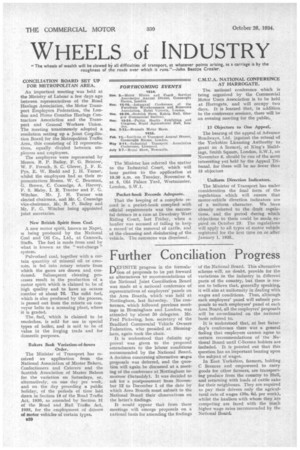Further Conciliation Progress D EFINITE progress in the formulation of proposals
Page 34

If you've noticed an error in this article please click here to report it so we can fix it.
to be put forward as alternatives be recommendations of the National Joint Conciliation Board was made at a national conference of representatives of employers' panels on the Area Boards, which was held at Nottingham, last Saturday. The conference, which followed previous meetings in Birmingham and London, was attended by about 50 delegates. Mr. Fred Pickering, hon. secretary of the Bradford Commercial Vehicle Owners Federation, who presided at Birmingham, again took the chair.
It is understood that definite approval was given to the proposed amendments to the labour conditions recommended by the National Board. A decision concerning alternative utagee proposals was deferred, and the question will again be discussed at a meeting of the conference at Nottingham tomorrow (Saturddy). It was decided to ask for a postponement from November 12 to December 1 of the date by which Area Boards must submit to the National Board their observations on the latter's findings.
It would appear that from these meetings will emerge proposals on a national basis for amending the findings of the National Board. This alternative scheme will, no doubt, provide for the variations in the industry in different parts of the country, but there is reason to believe that, generally speaking, it will aim at uniformity in dealing with wages and conditions. Thus, although each employers' panel will submit proposals to each employees' panel of each Area Board, all the employers' proposals will be co-ordinated on the national basis referred to.
It is understood that, at last Saturday's conference there was a general feeling that employers cannot agree to certain recommendations of 'the National Board until C-licence holders are included. It is pointed out that this question has an important bearing upon the subject of wages.
In East Yorkshire, farmers, holding C licences and empowered to carry goods for other farmers, are transporting produce from the country to Hull, and returning with loads of cattle cake for their neighbours. They are required to pay their drivers only the agricultural rate of wages (38s. 6d. per week), whilst the hauliers with whom they are competing are faced with the much higher wage rates recommended by the National Board.




























































































